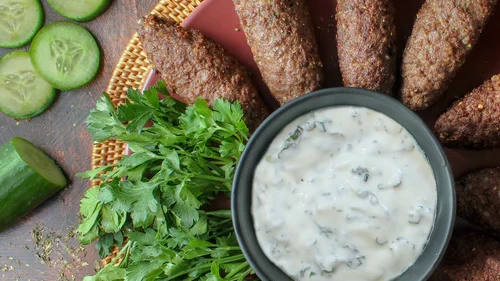Your Cart is Empty
Add description, images, menus and links to your mega menu
A column with no settings can be used as a spacer
Link to your collections, sales and even external links
Add up to five columns
Add description, images, menus and links to your mega menu
A column with no settings can be used as a spacer
Link to your collections, sales and even external links
Add up to five columns

Gluten free Kibbeh
Barb Hodgens

FINALLY, A GF KIBBEH METHOD THAT REALLY WORKS!
The word ‘kibbeh’ derives from an Arabic word meaning, “to form into a ball”. Kibbeh are however, far, far more than your average meatball. They are a double mince, meat-lovers delight with a unique flavour that once required deft fingers to craft just right. Their crispy outer casing and tasty filling, make them more like a stuffed croquette and they are simply delicious served warm with plain yogurt (or tzatziki) and Mediterranean salads.
Traditionally, kibbeh consists of an outer dough made of ground meat, Middle Eastern spices and bulgur (cracked wheat), stuffed with spiced beef and toasted pine nuts; meat encased in a meat parcel! Adding wheat to ground meat creates the unique pliability and strength required to mould and stuff. This is not easy to replicate in a gluten free version, but we did it!

Creating a gluten free version is an exciting culinary achievement. We switched the bulgur for a combination of cooked quinoa and tapioca flour and are chuffed to say that our GF kibbeh shells held up super well. Our dough passed the ‘Luvele meat grinder’ challenge with flying colours. The kibbeh making attachment was not only incredibly easy to use, but it turned out sleek cases that cooked to crispy perfection.
With the kibbeh attachment, the painstaking process of shaping the cases as thinly as possible by hand is now a thing of the past. But really your kibbeh will taste great whether they’re torpedo shaped, balls or flat patties. The kibbeh attachment creates the hole, so all you have to do is stuff and seal.
Luvele GF kibbeh; we’ve taken the work and the wheat out and left the lovely in.
Makes approx. 34 kibbeh






Gluten free Kibbeh
Luvele
Rated 3.7 stars by 7 users
The word ‘kibbeh’ derives from an Arabic word meaning, “to form into a ball”. Kibbeh are however, far, far more than your average meatball. They are a double mince, meat-lovers delight with a unique flavour that once required deft fingers to craft just right. Their crispy outer casing and tasty filling, make them more like a stuffed croquette and they are simply delicious served warm with plain yogurt (or tzatziki) and Mediterranean salads.
Ingredients
- ½ kg lean ground beef
- 1 medium onion finely chopped
- 1 tablespoon olive oil
- ½ teaspoon allspice (pimento)
- ½ teaspoon cinnamon
- ½ teaspoon salt
- Pepper to taste
- 1/3 cup pine nuts - toasted
- ¾ cup dry quinoa (makes approx. 2 cups quinoa cooked)
- 1 ½ cups water (for cooking the quinoa)
- ½ cup tapioca flour
- 1 large onion very finely chopped
- 1 ½ kg lean ground beef
- 1 ¼ teaspoons ground allspice
- 1 ½ teaspoons ground coriander
- ¾ teaspoons ground cinnamon
- 1 teaspoon dried mint
- 1 teaspoon black pepper freshly ground
- ½ teaspoon salt
- Oil for frying
FILLING
MEAT DOUGH
Directions
HOW TO COOK PERFECT QUINOA
- Pour the uncooked quinoa into a fine mesh strainer and rinse with cool running water, agitating the seeds with your hands to remove any residue.
Put the quinoa and water into a medium saucepan.
Bring to the boil without the lid on. Once it has reached a full boil, turn the heat down to low, place the lid on the saucepan, and simmer for 15 minutes, or until all of the water is absorbed and the seeds have popped open.
Remove the pan from the heat but leave covered for 5 minutes for the remaining liquid to be absorbed.
Set aside to cool.
GRIND THE BEEF
- Cut away any excess fat from the beef then slice into 5 cm square pieces and place in the freezer to chill for 30 minutes.
Fit the 8 mm cutting plate to the head then grind the total 2 kg of beef required for the kibbeh.
After grinding, divide the ground beef into 2 portions. Half a kilogram for the filling and 1 ½ for the dough. Cover and place in the fridge to stay chilled until required.
MAKE THE FILLING
- Heat the olive oil in a large skillet. Add the pine nuts. Stir continuously with a wooden spoon until golden brown.
Transfer the pine nuts to a small bowl but reserve the oil in the pan.
Add the chopped onion and sauté for about 5 minutes until soft.
Add the smaller portion of freshly ground beef, breaking it apart and turning with a wooden spoon. Cook until browned – approx. 5 minutes.
Once browned, stir in the seasoning and continue cooking for another 5 minutes until tender.
Remove from the heat, stir in the toasted pine nuts then set aside to cool while you prepare the Kibbeh dough.
PREPARE THE MEAT DOUGH
- Stir the tapioca flour into the cooked (and cooled) quinoa.
Place the ground beef into a large mixing bowl.
Add the quinoa, onion, and seasoning to then mix thoroughly with your hands to incorporate.
Fit the finer ‘5mm’ cutting blade to the meat grinder and feed the ground meat, dough mixture through the head and back into the bowl. Keep the meat dough in the fridge until required.
MAKE AND STUFF THE KIBBEH
- Remove the cutting blade and fit the ‘kibbeh attachment’ to the meat grinder.
Prepare your bench to begin turning out and stuffing kibbeh. You will need the meat filling and a teaspoon, a tray to sit the formed kibbeh and a small finger bowl of water.
Spoon a quarter of the meat dough into tray. Keep the remaining dough in the fridge to stay cool while you work.
Turn the grinder onto high. Feed the dough down into the head with one hand and use the other to support the kibbeh tube as it comes out.
Turn the machine off. Break off a section of ground meat tube with your hand.
Hold the tube in your hand. Rotate it while pinching one end to seal it closed, moulding the kibbeh shape you desire as you work. Wet the tips of your fingers if necessary.
- When one end is sealed, fill the hole with approximately one tablespoon of the filling. The kibbeh opening is narrow, so a teaspoon is the best. Use the handle of the teaspoon to nudge the filling deep inside.
Gather the opening edges together to seal the kibbeh closed in the same shape as the other end.
Turn the machine on again and repeat the process until the ingredients are finished.
Put the kibbeh in the fridge for 1 hour or overnight. (You can also freeze the kibbeh after stuffing).
FRYING
In a large saucepan, heat enough oil to cover the kibbeh. Working in batches, fry the kibbeh until browned, approx. 1-2 minutes. Remove with tongs or a slotted spoon and transfer to a plate lined with paper towel, to soak the excess oil.
BAKING
Preheat the oven to 180 C / 356 F. Arrange the kibbeh on a tray lined with baking paper. Brush with a light coating of olive oil, then bake until deep brown, about 25-30 minutes.
Serve hot or at room temperature with yogurt, (or tzatziki) and Mediterranean salads.
Recipe Video
PIN THIS RECIPE

Gluten free Kibbeh

FINALLY, A GF KIBBEH METHOD THAT REALLY WORKS!
The word ‘kibbeh’ derives from an Arabic word meaning, “to form into a ball”. Kibbeh are however, far, far more than your average meatball. They are a double mince, meat-lovers delight with a unique flavour that once required deft fingers to craft just right. Their crispy outer casing and tasty filling, make them more like a stuffed croquette and they are simply delicious served warm with plain yogurt (or tzatziki) and Mediterranean salads.
Traditionally, kibbeh consists of an outer dough made of ground meat, Middle Eastern spices and bulgur (cracked wheat), stuffed with spiced beef and toasted pine nuts; meat encased in a meat parcel! Adding wheat to ground meat creates the unique pliability and strength required to mould and stuff. This is not easy to replicate in a gluten free version, but we did it!

Creating a gluten free version is an exciting culinary achievement. We switched the bulgur for a combination of cooked quinoa and tapioca flour and are chuffed to say that our GF kibbeh shells held up super well. Our dough passed the ‘Luvele meat grinder’ challenge with flying colours. The kibbeh making attachment was not only incredibly easy to use, but it turned out sleek cases that cooked to crispy perfection.
With the kibbeh attachment, the painstaking process of shaping the cases as thinly as possible by hand is now a thing of the past. But really your kibbeh will taste great whether they’re torpedo shaped, balls or flat patties. The kibbeh attachment creates the hole, so all you have to do is stuff and seal.
Luvele GF kibbeh; we’ve taken the work and the wheat out and left the lovely in.
Makes approx. 34 kibbeh





PIN THIS RECIPE

Subscribe
Sign up to get weekly healthy recipes & information on new product releases.
Item is added to cart


